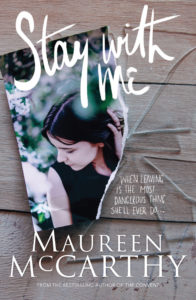Allen & Unwin
May 2015, RRP $19.95
Tess is leaving. ‘It’s around three a.m. I can’t be sure exactly, because I’m hiding under a house, ten minutes’ drive out of Byron Bay, off the old Bangalow Road… I’m not cold. It’s still summer – just.’
 Tess was seventeen when she travelled to Byron Bay for schoolies with a couple of friends. It was a break from the troubled years following the death of her father and desertion by her mother, events that had left her older sister, Beth, to lead a household of siblings. When Tess is offered a job in a Byron cafe and encounters the handsome, older Jay, she decides to stay. Four years on, Tess is trapped on a farm with Jay and their daughter, Nellie, with no job, money or friends.
Tess was seventeen when she travelled to Byron Bay for schoolies with a couple of friends. It was a break from the troubled years following the death of her father and desertion by her mother, events that had left her older sister, Beth, to lead a household of siblings. When Tess is offered a job in a Byron cafe and encounters the handsome, older Jay, she decides to stay. Four years on, Tess is trapped on a farm with Jay and their daughter, Nellie, with no job, money or friends.
‘Try and leave and I’ll find you. No woman messes with me, babe. I mean it.
But you say you love me.
I do love you.’
A chance meeting with Harry and the beautiful Jules at a library offers Tess an escape, a ride back to Melbourne and her family.
Tess and her daughter take their chance, and what unfolds is a road trip with Harry, and an unfurling sense of spaciousness in story and style as Tess slowly opens up to Harry and herself.
We encounter the past as flashbacks spaced between the gentle everydayness of conversation between Tess and Harry. We discover that Harry has suffered trauma of his own in a motorcycle accident that laid waste his parents’ hopes for his music career. The journey also allows us to get to know Nellie, three years old and deftly drawn by Maureen McCarthy, a robust, imaginative little character devoted to her stuffed bear Barry. If not for herself, Tess is leaving for Nellie.
The flashbacks nested within the story give us glimpses of the past as Tess reclaims her life story. The night before Tess’s mother departed, never to return, she announced that thirteen year old Tess is the namesake of her grandmother, Therese, committed for the rest of her life to a mental asylum by her husband, and, ‘no one in her life thought they might know better’.
Later, in flashback, a life turning-point for Tess occurs when she is hospitalised following a miscarriage. Hovering between life and death, Tess feels her grandmother lean in close and whisper ‘Keep breathing… Stay with me‘, which becomes a mantra as she escapes her destructive relationship with Jay and finds a path to reunite with her family. A kind nurse tells Tess her grandmother is waiting for her to claim her, to give her back her life, make her live again. Stay with me is inspired by McCarthy’s grandmother’s experience.
Domestic violence has, it seems, finally been publicly acknowledged in recent times as the urgent, undismissible problem it is, largely following Rosie Batty’s sad story and courage to speak out publicly. As a part of the conversation about domestic violence, Stay with me is topical, yet still, it is its own story.
As Tess leaves and unfurls ownership over her own life, she remains in the terrible bind cast by the power of her destructive relationship with Jay, whom she believes will come for her and kill her. This is the murky, thorny nub of domestic violence, the corruption of partnership and the romantic notions around union in partnership, the presupposed ideal that two-become-one. Here, the ideal is corrupted into the notion of woman—usually it is a woman—as property, which I would suggest plays out more as woman viewed by man as a piece of himself, and therefore a remote part to project his own uncomfortable ideas about himself onto. Amateur psychologising aside, Tess’s grandmother might have been thought to be mentally ill following the suicide of her sister, and perhaps her husband acted with the best of intentions, but Therese’s story echoes the same notion that a husband can control the life of his partner.
But Stay with me is not a grim tale. It is a story of healing and moving forward, a story of the healing of the past of this lifetime, and perhaps the injuries of ancestors whose stories live on into the present. It is of course a sad story, and a little harrowing, but there is also humour and much light. We see light and hope in Nellie, and the warmth between Tess and Harry, and Tess’s family. McCarthy has a knack for drawing all her characters as if from life.
In the end it is the thread of hope that is strongest in Stay with me. Tess recalls in the glimpses she saw of her grandmother:
‘I saw things and heard things that I couldn’t possibly have heard. But even during the worst times some part of me knew to hang on. That if I was brave and lucky enough, I might just make it to a new life’.
New beginnings are possible.

